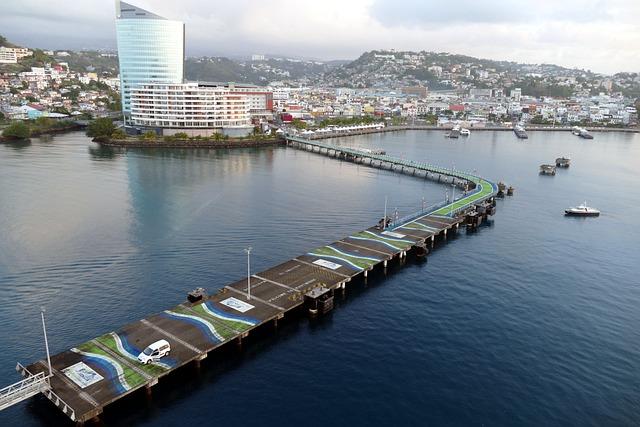In the vibrant heart of Fort-de-France, where the rhythm of island life dances alongside the echoes of bustling markets and serene streets, a pressing issue has taken center stage: the challenge of public hygiene amid urban living. As the capital of Martinique embraces its role as a cultural hub, concerns regarding the prevalence of public urination have prompted city officials and residents alike to engage in a spirited dialog about solutions. « Fort-de-France en lutte contre les pisseurs de rue au centre-ville » delves into the strategies being implemented to address this social and sanitary dilemma. with a focus on community collaboration, public awareness, and sustainable practices, this article explores the multifaceted approach Fort-de-France is taking to restore the cleanliness and dignity of its beloved city center.
Fort-de-France’s Urban Challenge: Addressing Public Urination in the City Center
In an effort to enhance the urban environment and tackle the growing concern of public urination, Fort-de-France authorities are implementing a series of innovative measures. The issue has drawn significant attention as it impacts the city’s cleanliness, public health, and overall aesthetic appeal. To combat this challenge, a multi-faceted approach is being proposed that includes:
- Infrastructure Enhancements: Installation of public restrooms at key locations throughout the city.
- Awareness campaigns: Launching initiatives to educate residents and tourists about the negative effects of public urination.
- Increased Surveillance: Employing community officers to ensure adherence to public decency laws.
Moreover, the local government is exploring advanced solutions, such as the use of technology to monitor hotspots for public urination and strategic placement of portable toilets during high-traffic events. The focus is not just on penalization but also on creating a supportive infrastructure that caters to the needs of urban dwellers and visitors. A collaborative approach involving:
| Stakeholder | Role |
|---|---|
| City Council | Policy formulation and funding |
| Local Businesses | Support and sponsorship |
| Community groups | Awareness initiatives |
This collaborative effort not only aims to address the immediate issue but also emphasizes the importance of community involvement in cultivating respect for public spaces. By prioritizing cleanliness and personal responsibility, Fort-de-France is striving to reclaim its streets and foster a more pleasant urban experience for everyone.
The Societal Impact of Street Urination on local Communities
The issue of public urination in urban centers like Fort-de-France transcends mere inconvenience; it profoundly affects local communities in various ways. Health risks increase as unsanitary conditions can lead to the spread of diseases, impacting residents and visitors alike. Moreover, aesthetic degradation of public spaces can deter tourism, influencing local businesses that thrive on foot traffic. The prevalence of this issue raises questions about urban planning and community welfare, reflecting a broader societal challenge that demands comprehensive solutions.
Communities often respond to these challenges through public awareness campaigns and community outreach initiatives aimed at fostering responsible behaviour. Local government can play a pivotal role by providing adequate restroom facilities and enforcing regulations effectively. Engaging the community through discussions and feedback may lead to creative solutions, such as integrating artistic public toilets that blend into the urban landscape. The overarching goal remains clear: to create a cleaner, healthier environment for all inhabitants while nurturing a sense of responsibility among community members.
Exploring Innovative Solutions: How Other Cities Tackle Public Lavation
As urban areas continue to grapple with issues of public sanitation, cities around the globe have implemented innovative solutions to tackle the contentious issue of public urination. For instance, places like Berlin and Amsterdam have taken proactive measures, integrating hi-tech toilets into their public infrastructure. These facilities not only provide hygiene and privacy but also feature automated cleaning systems that maintain sanitation,ensuring a pleasant experience for users. Additionally, the deployment of urinal kiosks in strategic locations allows for controlled and discreet options for relieving oneself, reducing the frequency of public urination incidents substantially.
Another noteworthy example can be found in San Francisco, where the city authorities have prioritized the installation of self-cleaning restrooms. These restrooms are equipped with touchless technology and are designed to be accessible to all while minimizing the risk of vandalism.Furthermore, cities like Tokyo have embraced cultural awareness by promoting public lavatories that reflect local artistry, helping to normalize their usage while also enhancing the aesthetic value of public spaces. As municipalities like Fort-de-France look to combat public urination, drawing inspiration from these successful models coudl lead to a cleaner, more dignified urban experience for residents and visitors alike.
Collaborative Efforts: Engaging Local Citizens and Businesses in the Fight
In an effort to tackle the issue of public urination in Fort-de-France, local authorities are actively rallying community members and businesses to join the cause. By fostering a sense of collective responsibility, they aim to create a cleaner and more welcoming environment for both residents and visitors. the initiative encourages participation through various avenues, including:
- Community Clean-up Events: Organizing regular efforts to keep public spaces clean.
- Awareness Campaigns: Distributing informative materials that educate citizens about the importance of maintaining hygiene in public areas.
- Local Business Partnerships: Collaborating with establishments to provide public restrooms and increase visibility for the initiative.
Local businesses also play a pivotal role by offering their facilities for restroom use and supporting community initiatives. This partnership not only enhances the community’s image but also encourages patrons to engage in responsible behavior. To highlight the expected contributions from various stakeholders, the following table outlines their roles:
| Stakeholder | Contribution |
|---|---|
| Local government | Funding and organizing community programs. |
| Civic Groups | Mobilizing volunteers and spreading awareness. |
| Businesses | Providing restroom access and promoting campaigns. |
| Citizens | Participating actively and encouraging responsible behavior. |
Maintaining Dignity and Health: The Need for Public Restroom Facilities
In urban areas such as Fort-de-France, the urgent demand for public restroom facilities underscores the need for a thoughtful approach to maintaining both dignity and health for all citizens. The presence of clean, accessible restrooms can mitigate public urination issues, which are often associated with inadequate sanitation options. By investing in these facilities, cities not only promote hygiene but also foster a sense of respect and dignity for individuals, especially for those who may not have stable access to private restrooms.
Public restrooms also serve a vital role in enhancing public health by preventing unsanitary conditions that can arise from outdoor urination. Consider the benefits that can arise from improved restroom access:
- Reduces health risks – Proper sanitation helps in preventing the spread of diseases.
- Enhances public image – Well-maintained facilities reflect well on the city’s commitment to cleanliness and community well-being.
- Encourages tourism – A city that prioritizes public amenities is more attractive to visitors.
Moreover, with strategic placement of these facilities, cities can better manage public spaces, allowing for a more harmonious urban environment.The investment pays dividends not only in practicality but also in the overall sense of community pride and personal dignity it can foster among citizens.
| Benefit | Description |
|---|---|
| Public Health | Prevents the spread of germs and diseases. |
| Social Dignity | Offers privacy and respect to all individuals. |
| Civic Pride | encourages a sense of community responsibility. |
Prospective Pathways: Sustainable Strategies for a Cleaner Fort-de-France
The challenge of public hygiene in Fort-de-France is not just a matter of aesthetics; it directly impacts the city’s tourism and local business climates. To tackle the issue of public urination, a series of sustainable strategies can be implemented to enhance community pride and cleanliness. These may include:
- increased Availability of Public Restrooms: Installing accessible,well-maintained restrooms in key areas can effectively reduce the incidence of public urination.
- Awareness Campaigns: Educating residents and visitors about hygiene and community responsibilities can foster a culture of respect for public spaces.
- Collaboration with Local Businesses: Engaging local businesses to offer restroom access can also appeal to neighborhood support and reinforce communal responsibility.
Additionally, innovative design concepts such as eco-pleasant public sanitation solutions can change the landscape of urban hygiene. These could include:
| Strategy | Benefits |
|---|---|
| Smart Toilets | Utilize technology for maintenance alerts and better sanitation. |
| Portable units | Flexible placement during events to meet increased demand. |
| community Vouchers | Encourage businesses to provide restroom access for customers. |
By combining practical solutions with community engagement, Fort-de-France can pave the way for a cleaner, more welcoming environment for all. The initiative not only addresses the immediate issue but also promotes a more cohesive and thriving urban community.
Wrapping Up
In the heart of Fort-de-France, a battleground emerges—not one of traditional warfare, but of urban cleanliness and public health. As local authorities mobilize against the growing challenge of street urination in the city center, the initiative reflects a broader commitment to enhancing the quality of life for residents and visitors alike. The steps taken by the municipal government highlight the complexities of urban management and the need for innovative solutions that balance personal freedoms with communal respect. As discussions continue and measures are implemented, Fort-de-France stands at a pivotal moment, one that could redefine its landscape and set a precedent for other cities grappling with similar issues. The unfolding narrative of this tropical city serves as a reminder of the ongoing struggle between modernity and tradition, and the necessity of collaboration in nurturing public spaces that are clean, welcoming, and vibrant for all.
